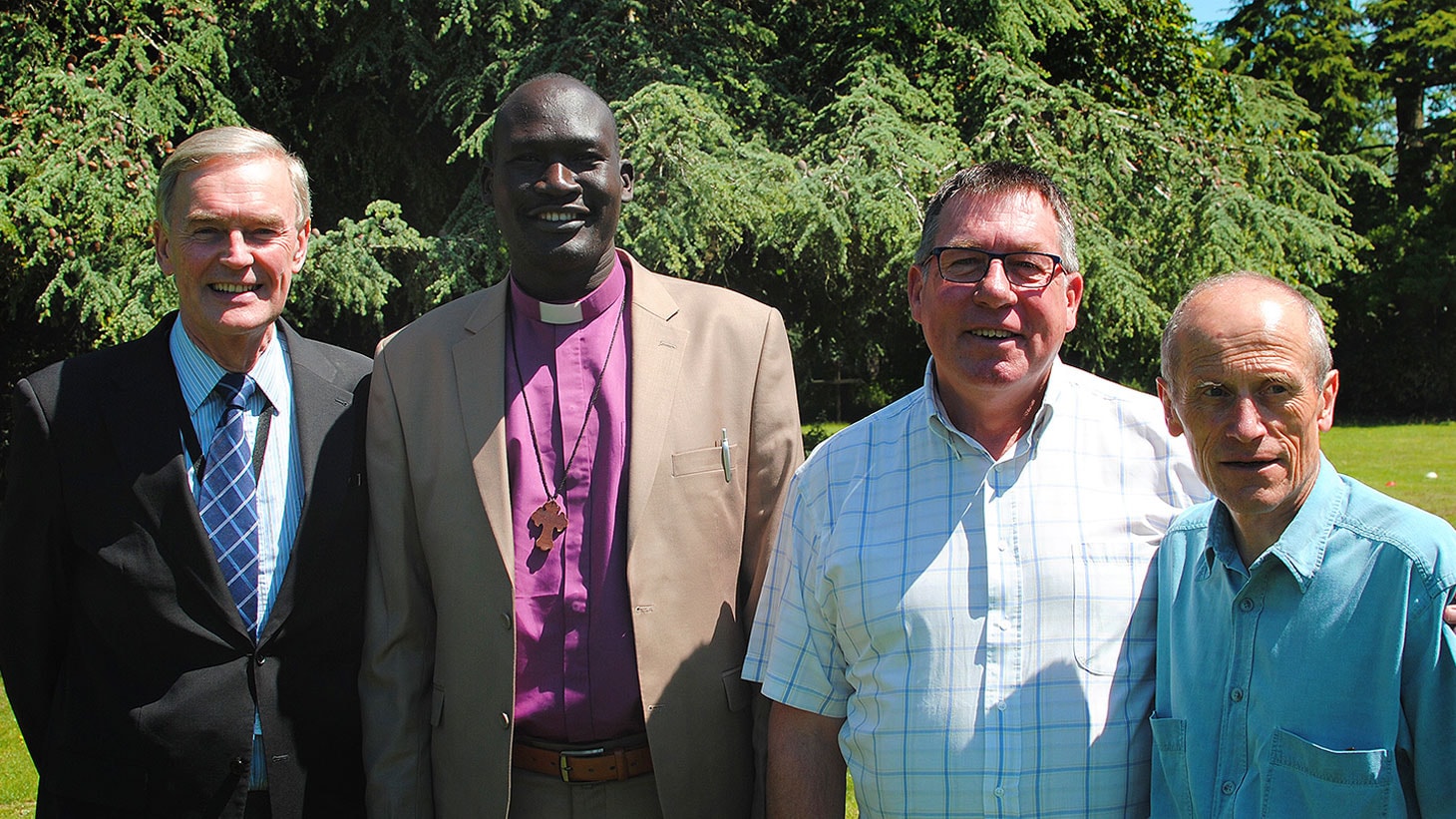Above: (Left to right) Steve Brady, Moorlands College Principal; Archbishop Moses; Ian Coffey, Moorlands College Vice Principal (Strategy); and Jeff Neagle, Wau Partnership Committee Chair.
Accompanied by members of the Poole Deanery, and enjoying lunch with members of our senior staff, Archbishop Moses included Moorlands College in a whistle-stop visit to the region. Archbishop Moses was appointed in May this year as Area Archbishop to a group of five Dioceses in South Sudan, of which the Wau Diocese is twinned with Poole Deanery.
Archbishop Moses was particularly keen to visit a UK theology college, in his role overseeing the Diocese’s own theology college, St John’s. The Diocese of Wau, part of the Episcopal Church of Sudan and South Sudan (ECSSS), also runs a number of its own primary schools and a development charity. It aims to address the educational needs of both church and society in Wau and the wider region of South Sudan, a country struggling to re-establish itself after many decades of war and neglect.
Bishop Moses’ vision for the College was always more than just to teach theology. The curriculum for pastors majors on theology, but it also includes other disciplines that are vitally needed by pastors in South Sudan today, faced by the aftermath of 30 years of war and instability—peace and reconciliation, community development and counselling, to name a few.
A Diocese the size of England
South Sudan is the world’s newest country, gaining its independence from Sudan in 2011 to huge popular acclaim after decades of civil war. Roughly the size of France or Afghanistan, much of the country is a vast plain of grass and scrub, with mountains in only a few places. Wau is the name of South Sudan’s second city, located in the western part of the country and 400 miles away from the capital of Juba by road or air. Wau Diocese is one of the largest in the country, covering an area the size of England.
The ECSSS is growing significantly in numbers at present. For example, Bishop Moses confirmed 1,100 people at Easter 2012; then 2,000 people in June 2013, and more than 3,000 in June 2014.

Above: Wau from the air, during the wet season
A growing church, a pressing need for training
Serving the Bahr al Ghazal Region, which covers almost a third of South Sudan and has almost a third of its population, St John’s College is fundamental to Bishop Moses’ strategy for Wau Diocese. The majority of the 400 pastors currently in Wau Diocese have no more than a primary school education—partly the result of the conditions of war at a time when large numbers of people were becoming Christians. In an effort to meet the needs of these new converts, many people were ordained without any training at all, and it was not long before these new pastors found themselves struggling to cope because of their lack of education. Starting in 2011 with just three students, the College now has 120 with over 100 wanting to enrol for next year. It held its first graduation ceremony in April 2016.



Above: Scenes from the ECSSS in Wau
About Archbishop Moses
Moses was born in 1976 and spent the best part of his childhood in the cattle camp and village where schools were non-existent. Children had no access to formal education, so they looked after cows.
Moses became a Christian after a serious illness. While receiving medical treatment he met a young evangelist, Wilson Garang, who taught him to read and write the Dinka dialect. After learning Dinka, he started leading prayers in church, becoming an evangelist in 1994, attending Bible school and being formed for future church leadership.
In 1995, while travelling to Khartoum to seek better treatment, Moses was detained on suspicion of being a member of Sudan People’s Liberation Army/Movement (SPLA/M). While in detention he was tortured by the Sudan Armed forces. On release he had no money to pay for his transport to Khartoum, and spent time working in a sugar factory, and as a bricklayer, to fund treatment and transport back to the South in 1997. He was ordained priest by Bishop Henry Chuir Riak of Wau in 1999.
Moses is married, with two children. At present his family lives in Nairobi.
Through his experience as a relief worker, Bishop Moses sees Christian ministry in the Sudan as a blend of evangelism and social development. His home territory remains the site of persistent tribal clashes, and promotion of peace is one of the major ongoing challenges for Bishop Moses and his colleagues.




